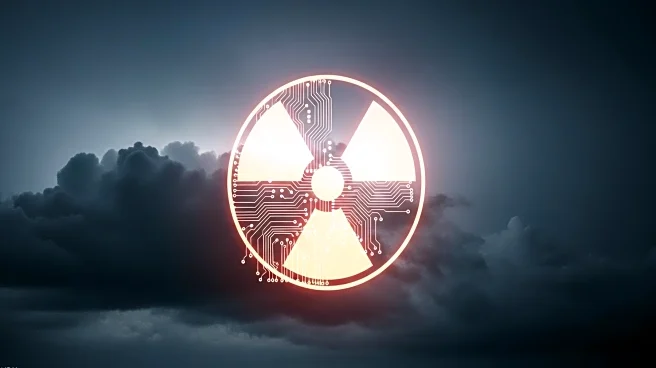What is the story about?
What's Happening?
The Zaporizhzhia nuclear plant, located in Russian-occupied territory in Ukraine, has been without external power for over three days, raising significant safety concerns. Emergency generators are currently being used to maintain cooling and safety systems after the final power line was severed on the Russian side. Rafael Grossi, Director General of the International Atomic Energy Agency (IAEA), has expressed deep concern over the situation, which has persisted despite his meeting with Russian President Vladimir Putin. Western experts and Ukrainian officials suspect that Russia may be using the crisis to strengthen its control over the plant, which is Europe's largest nuclear facility. The plant's reactors, capable of powering four million homes, have been in cold shutdown since Russia seized the site in March 2022.
Why It's Important?
The prolonged outage at the Zaporizhzhia nuclear plant poses a significant risk of a nuclear accident, which could have catastrophic consequences for the region and beyond. The situation highlights the vulnerabilities of nuclear facilities in conflict zones and the potential for such sites to be used as leverage in geopolitical disputes. The IAEA's concerns underscore the importance of maintaining nuclear safety standards and the challenges posed by the ongoing conflict in Ukraine. The potential restart of reactors under wartime conditions is unprecedented and could lead to severe environmental and human impacts.
What's Next?
There are indications that Russia may be close to installing a new power line to the Zaporizhzhia plant through occupied territories, which could resolve the immediate crisis. However, the broader geopolitical implications remain uncertain, as the plant's integration into the Russian grid could further complicate international negotiations. The IAEA is urged to intervene and demand that Russia abandon plans to restart reactors, emphasizing the responsibility for nuclear safety and security. The situation remains fluid, with potential developments in infrastructure and diplomatic efforts likely to influence the outcome.
Beyond the Headlines
The crisis at Zaporizhzhia highlights the ethical and legal challenges of operating nuclear facilities in conflict zones. The use of such sites as bargaining chips in geopolitical disputes raises questions about the protection of civilian infrastructure and the responsibilities of occupying forces. The situation also underscores the need for international cooperation and oversight in ensuring nuclear safety, particularly in regions affected by conflict.
















